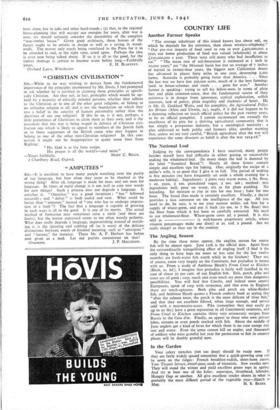" AMPUTEES "
sm,--It is excellent to have many people watching over the purity of our language, but how often they seem to be shocked at the wrong thing! After all, language is made for man, and not man for language. In times of rapid change is it not well to coin new words for new things? Such a process does not degrade a language. It enriches it. " Omnibus " was a good invention ; " bus " followed naturally ; and " debus " is both useful and neat. What could be better than " amputee," instead of " one who has to undergo amputa- tion of a limb "? The fact that a language is capable of growing in such ways is all to the good. It is one of its merits. The actual method of formation may sometimes raise a smile (and there are limits), but the horror expressed seems to me often merely pedantic. What does really degrade a language, impoverishing instead of enrich- ing it, is the ignoring and rubbing off (as it were) of the delicate distinctions between words of kindred meaning, such as " anticipate " and " foresee," for instance. There Mr. A. P. Herbert has before now given us a lead. Let our purists concentrate on that!


























 Previous page
Previous page